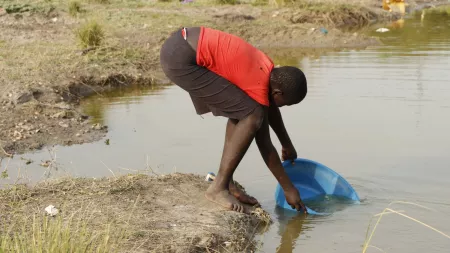8th December 2021, Juba South Sudan – South Sudan is currently struggling with flood, the intensity of which has not been seen in decades. Entire States have been affected with communities living submerged since the start of the year. Many people in remote areas remain cut off from humanitarian aid, worsening an already critical humanitarian crisis in the country and disrupting humanitarian access to those most in need.
Heavy flooding cause by intense seasonal rains has been impacting large areas of South Sudan since July. Over 800,000 people across 8 of the country’s 10 states have been affected and an estimated 426,000 people have been displaced since 2020, as floods have destroyed shelters, infrastructure and disrupted people’s access to services. Bentiu, the capital of Unity State, where CARE runs nutrition and protection programming has been particularly hard hit.
Interim CARE South Sudan Country Director Abel Whande says, “For the first time, we are seeing what would normally be a relatively regular localised seasonal occurrence become a major humanitarian crisis. The climate crisis is exacerbating weather patterns across East Africa. In South Sudan it is pushing communities already weakened by conflict, displacement and chronic hunger to the brink with floods destroying food stocks, livelihoods and homes.”
Already one of the world’s most logistically challenging countries in which to provide aid, the recent floods have made access to communities most at need extremely difficult for humanitarian agencies such as CARE. Canoes and specialised equipment are now needed in order to reach these cut off communities with life-saving aid. Flooding has also destroyed critical facilities, including health centres and supplies.
Whande says, “On a recent visit to Bentiu I saw entire villages underwater, people living and sleeping out in the open and not even able to gather dry firewood as trees are submerged. This is the worst flooding in decades and it is the first time we are seeing such extended and persistent flooding in the South Sudan context with flood waters in Bentiu since February this year. And there are no signs that the water will go anytime soon, despite the onset of the Dry Season.”
Some of the biggest immediate needs of those affected by the flooding include safe drinking water, temporary shelter, mosquito nets, medicines, firewood and emergency food assistance. But longer-term assistance and climate mitigation measures and financing will also be crucial.
Whande notes, “It is really a ticking time bomb for communities in areas such as Bentiu. Entire farms and livelihoods are now under water and the risk of waterborne disease outbreaks and other illnesses increases every day that now stagnant water remains. The hundreds of thousands of displaced men, women and young children living in flood affected areas are particularly at risk. This is an additional crisis coming on top of an already immense and protracted humanitarian crisis that has left over 70% the population in need of humanitarian assistance, and 60% living with crisis levels of food.”
He adds, “the flooding presents increased risks and worries for women and girls in particular. With homes and safe spaces destroyed that face a lack of privacy, sanitary items and are at an increased risk of gender-based violence as families struggle to cope with the devastating impact of the floods.”
CARE has adapted its nutrition activities to reach the displaced person with critical life-saving assistance. In addition, it plans to provide basic water, sanitation and hygiene supplies to women and girls to reduce protection risks. But more funds are urgently needed to do this.
Whande says, “The last thing the women and men of South Sudan need is to bear the brunt of a largely developed nations fuelled climate emergency that they were not responsible for creating. South Sudan is already facing one of the world’s worst humanitarian crises, this additional stress on an already overwhelmed population is truly catastrophic.”
Notes to Editor
-
CARE has spokespeople available in Bentiu and the capital Juba as well as climate specialist spokesperson based in Kenya.
-
Since 2013 CARE to date has been implementing Nutrition project and GBV mainstreaming covering all the 9 Payams in Rubkona County targeting under five children, pregnant and lactating women. CARE is scaling up Nutrition integrated response in total of 13 Nutrition facilities and outreach sites to meet the needs of the affected people. So far since onset of flood in the county CARE under nutrition program has been able to reach over 7,000 people.
